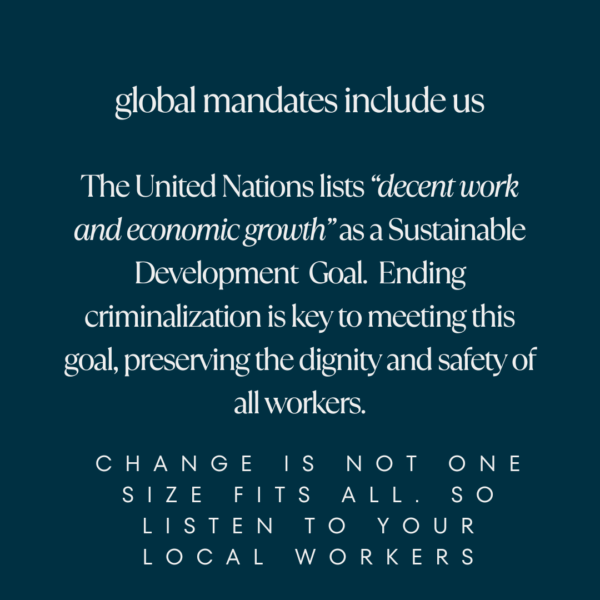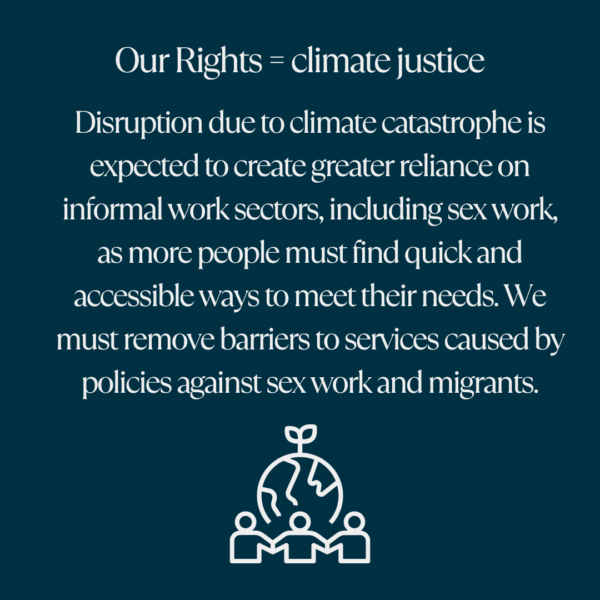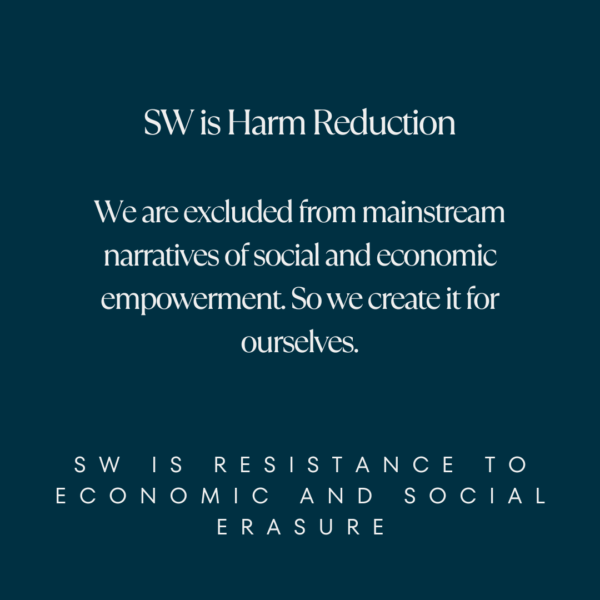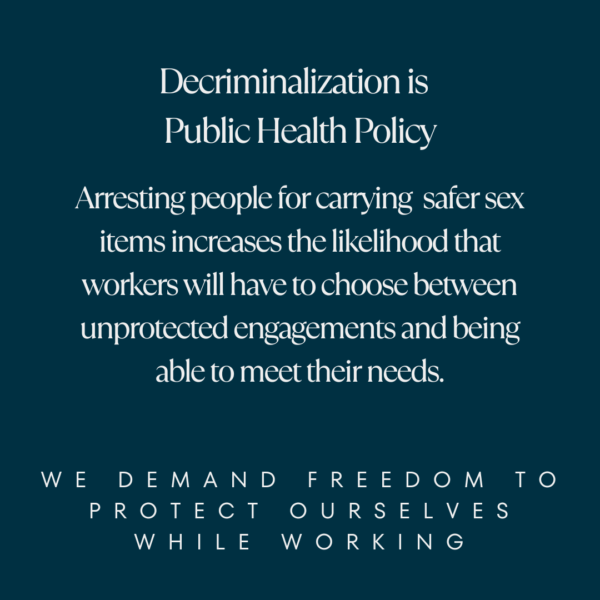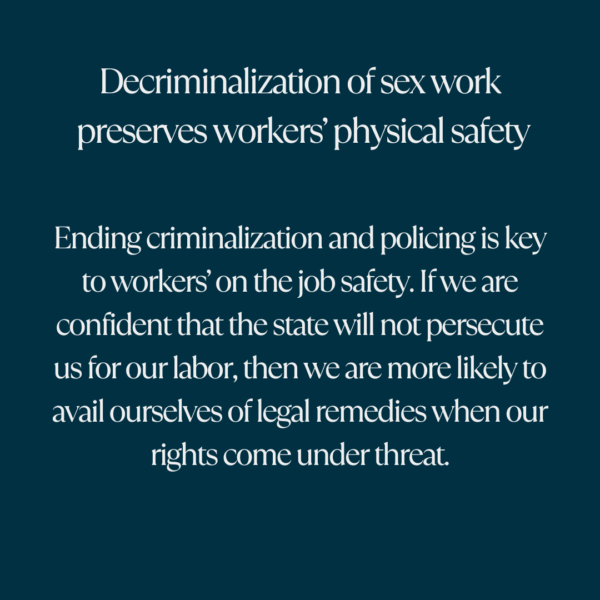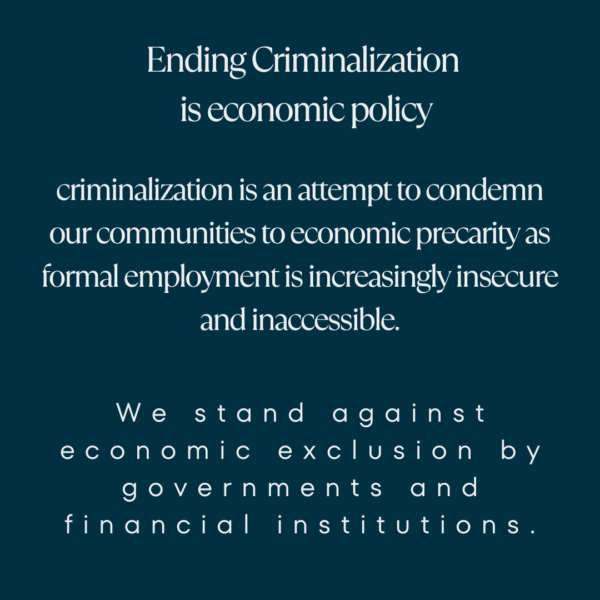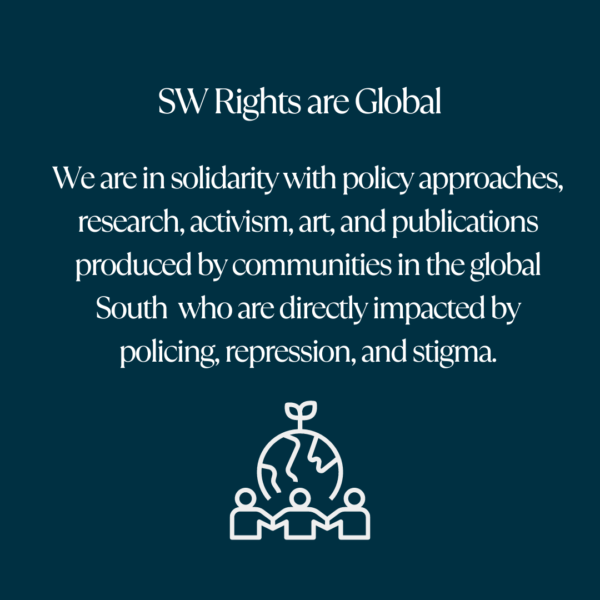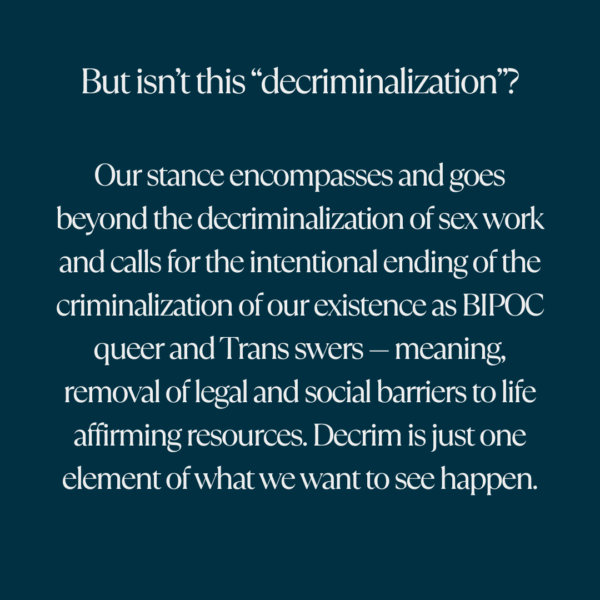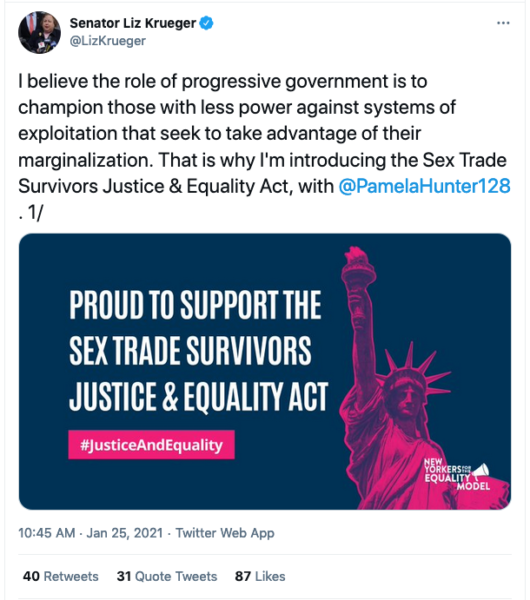BPPPers Zee Xaymaca and Jenna Torres have developed a living document on the rights of sex workers that we are releasing just in time for International Whores Day (June 2, 2024) and in advance of international UN meetings where sex work will be affirmed. Co-directors Penelope Saunders and Erika Smith contributed to the document as well. The document can be accessed as a Google Doc. And below as the full report text. Zee has also created some images for social media. Share them widely.
BPPP POSITION PAPER ON SEX WORKER RIGHTS
(as of June 2, 2024)
A DYNAMIC DOCUMENT UPDATED REGULARLY
Sex work, the exchange of sexual services for material benefit, is a lasting feature of our society and economy. Sex work is an umbrella term that is intended to be expansive to include various types of legal, stigmatized, and/or criminalized forms of work. This term is used to advocate for and defend rights globally.
Sex workers, like all who sell their labor, choose to engage in this exchange for a myriad of reasons that must be respected if sex workers are to be supported by public policy. It is important to center that achieving sex worker rights is not a linear process, but a long-term engagement with all communities of sex workers, prioritizing the communities directly impacted by policing, repression, and stigma. There is no “one-size-fits-all” policy solution other than the call for full decriminalization of the sex trades and the ending of the criminalization of our lives.
As sex workers and activists with decades of experience advocating for sex workers’ rights, we have created a body of work that outlines our position on sex work as an element of society. We have documented the ways in which governments, states, municipalities, non-governmental organizations, and global entities use policy to try, and fail, to repress our voices. The following outlines some of the consequences of erasure for sex workers, our resistance to this organized violence, and our policy recommendations that are truly sex worker-inclusive.
Anti-Racism, Anti-Oppression
The criminalization of sex work is weaponized by government entities against Black, Indigenous, and People of Color (BIPOC) folks, immigrants, trans and gender non-binary people, women of color, and folks who are parents, poor, disabled, unhoused, and/or drug users.
All aspects of collective organizing for the rights of sex workers must be committed to ending this racism and other forms of oppression such as classism, ableism, xenophobia, transphobia, whorephobia, and misogyny. The process of developing policy and advocacy positions in any sector and social movement must challenge two issues: first, that the spokespersons whose voices are amplified are usually white, cis, and from the global North; second, that measures proposed prioritize white, cis-hetero persons’ needs over addressing the complex structures that make these measures insufficient for queer BIPOC folks and other oppressed groups listed above. We are in solidarity globally with policy approaches, research, activism, art, and publications produced by communities in the global South directly impacted by policing, repression, and stigma.
The only path to equitable outcomes is policy engineered by the folks directly impacted by policing, arrest and the injustice systems, and implementation led by us.
This stance goes beyond the decriminalization of sex work and calls for the intentional ending of the criminalization of our existence as BIPOC queer and Trans sex workers — meaning, the removal of legal and social barriers to life-affirming resources.
Economics
Sex work is resistance to economic disenfranchisement. For many who have been excluded from formal employment markets, sex work is a viable way to meet our needs. Policies that criminalize sex work and our lives seek to condemn sex workers to continued economic precarity. Money is a means, and often the only means under capitalism, of attaining security and survival. Engaging in compensated sexual labor is a reclamation of value for work that is devalued by capitalism. Our labor is a crucial aspect of the United States and global economies. We support our communities with our incomes and continue to build stability for ourselves as a response to state-sanctioned economic violence such as laws that make it impossible for sex workers to operate safely, i.e. loitering laws, and solicitation statutes. We also resist policies that prevent sex workers from accessing banking and financial services, and we support alternatives developed by our communities to access such services and provide mutual aid.
Agency
Sex work decriminalization is the ending of all laws and policies restricting sex work. This combined with the ending of the overall criminalization and policing of sex workers’ lives removes barriers to organizing against exploitative employment practices and violence, thereby securing the autonomy of all who engage in sex work. Ending criminalization and policing is key to sex workers’ on-the-job safety. If we are confident that the state will not persecute us for our labor, then we are more likely to avail ourselves of legal remedies when our rights come under threat. Decriminalization and ending the criminalization of our lives acknowledge that we are rational beings and protect our rights.
Security
Criminalization is a threat to security. Online advertising platforms, for example, allow sex workers worldwide to find and pre-screen customers/clients online, allowing many to screen in a way they find secure. These safety measures are being destroyed by the criminalization of online assembly and speech. Sex workers who do not depend on or have access to the internet have also established screening and safety protocols, however, the threat of police harassment undermines these practices leading to rushed negotiations and less time to assess danger. Police also use loitering laws to harass Trans and Gender Non-Binary persons regardless of their sex worker status. The threat of arrest does not reduce “demand” but rather creates danger for our communities engaging in sex work.
Public health
Under criminalization, carrying safer sex items can be used as evidence of engaging in sex work. The criminalization of carrying condoms and lubricants adds a public health component to anti-sex work laws and policies. Condoms are an effective and accessible way to prevent the transmission of sexually transmitted infections. Arresting people for carrying them increases the likelihood that workers will have to choose between unprotected engagements and being able to meet their needs. Sex workers have been at the forefront of global HIV advocacy despite the hostility we often face in these spaces. Trans people have long advocated for bodily autonomy and decriminalization of sex work as a public health measure. Transgender and gender-expansive persons are more likely to face barriers to accessing preventative healthcare as well as ongoing treatment for chronic illness due to gender discrimination. Reproductive rights come under threat when sex work is criminalized as persons who engage in the sex trades often face stigma when they reveal their vocation in seeking access to care and information that promote reproductive autonomy. This may look like engaging with hostile or ignorant medical personnel or being denied healthcare altogether. This reality means decriminalization and destigmatization of “paraphernalia” (including other harm reduction items like syringes and fentanyl testing strips deemed tools of illicit activities) in addition to decriminalizing the sex trade is a crucial step in protecting the health of gender-expansive populations.
Harm Reduction
Sex work can be the nexus of several forms of marginalization. However, it is not marginalization in itself, but a mode of resistance to economic and social erasure. We are excluded from mainstream narratives of social and economic empowerment. So we create it for ourselves, sometimes confronting and managing risks, but this is less perilous than continued engagement with state apparatuses. Sex workers who have been criminalized are ineligible for work-related social services like welfare or state-sponsored healthcare. We create these resource networks for ourselves through mutual aid and cross-movement advocacy. Sex workers are intimately acquainted with the implications of disability, climate, reproductive justice, prison abolition, and other movements that advocate for broader rights recognition and resource access.
Climate Justice and Migration
As climate catastrophe causes displacement and change, there will inevitably be an increase in the number of people whose livelihoods are suddenly disrupted. This is expected to create greater reliance on informal work sectors, including sex work, as more people must find quick and accessible ways to meet their needs. In light of this ongoing disruption, state social service structures must avail themselves to more people, including refugees and long-term immigrants. Decriminalization of sex work removes a major access barrier for migrants seeking assistance by protecting migrants regardless of their status as a sex worker.
Conclusions
Sex worker voices matter. Our voices are essential in achieving rights for ourselves, the collective liberation of other workers in other sectors, and achieving change via other social movements. We once said, “Nothing about us without us.” Now we say: Without us, nothing can truly change. Our rights are not something that can be thought about later. Our rights and our voices are foundational.
When we remove the barriers of criminalization, we have more agency and autonomy to make choices and seek support in navigating the realities of our work without the fear of prosecution or other systemic harms. The option to engage in sex work is not the problem. The true issue is the environment created when all the intersecting circumstances such as social, systematic, and economic inequality show up as barriers and their impacts on our community who are just trying to provide for themselves and others. As people who often sit at the margins of many intersecting identities and how the world is shaped around us to hold our experiences, we are left to battle both domestic and global impacts. We have to navigate the constantly changing landscape because of the negligence we face by being underrepresented in larger conversations. Policies that have neglected our autonomy, security, health, safety, stability, and climate.
The recommendations that we collectively want are the recommendations that give folks the most autonomy. These are the complete removal of policies that prohibit the sex trades and the ending of the daily criminalization of our lives. These recommendations allow sex workers to freely create resources that keep everyone safe and supported. Resources such as harm reduction tools to engage in safer sex, access to culturally competent healthcare, the ability to create online platforms to screen clients or continue to use platforms without fear of shutdowns, and freedom to engage in our community for safety. The sex trade prohibitions are largely created out of fear, moralizing, and the general misunderstanding of how and why people engage in sex work. People in the sex trades want the ability to be safe and supported just as much as any other labor job. We are asking for nothing more than what is already highlighted as the global standard by including sex workers and our livelihood in the United Nations Sustainable Development Goals. Specifically, we refer to goal number 8 that pertains to the idea of decent work and economic growth.
We have consistently demonstrated our presence in public health, labor rights, reproductive justice, and human rights as advocates for a non-exploitative labor environment. Sex workers are often the first line of defense when people are experiencing harm and we are the ones who help folks navigate pathways to obtain the right resources. We deserve safe working environments to create self-determination in ways that otherwise may not be possible. Our access and insight are invaluable.
Authors: Zee Xaymaca and Jenna Torres, with Penelope Saunders and Erika Smith


